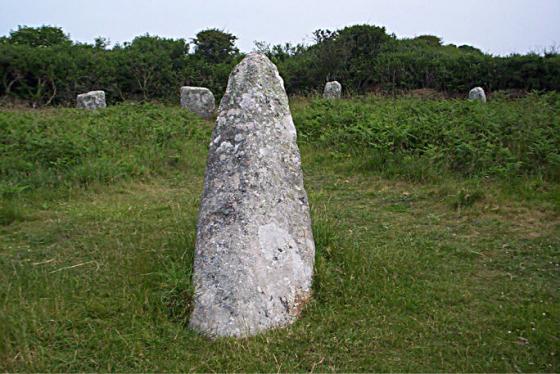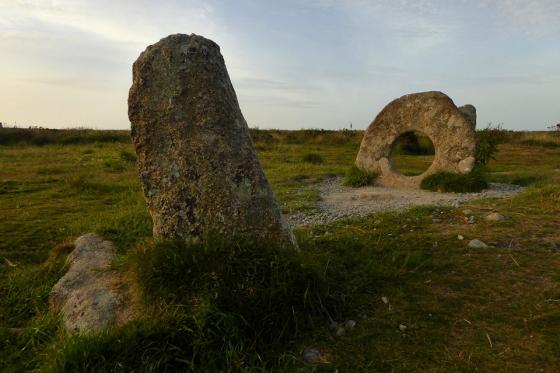





The little figure, just about discernible through the lichen and moss, on what may have originally been a standing stone. There’s another one at the village church at Paul, near Mousehole, built into a wall.

Tried riding a pack-horse through it and nearly succeeded!

St Levan’s Stone and the most “menhir-ish” of several ancient churchyard crosses

St Levan’s Stone

Visited as a slight detour from a coast path walk from Land’s End to Treen. The stone is an oddity, it reminds me of a big stone beetle and must have predated the church being sited here. There are several ancient stone crosses in the churchyard, one of which is of a respectable “menhir” height. [Not very prehistoric, but there are some good carved bench ends inside the church too.]
Further back up the coast path we passed the remains of St Levan’s Well, but didn’t linger to try the water – we were looking forward to a different kind of drink at the Logan Rock at Treen!
Robert Hunt (in his ‘Popular Romances of the West of England’, 1881) wrote:
This stone must have been venerated for the saint’s sake when the church was built, or it would certainly have been employed for the building. It is more than fifty years since I first made acquaintance, as a child, with the St Leven Stone, and it may be a satisfaction’ to many to know that the progress of separation is an exceedingly slow one. I cannot detect the slightest difference in the width of the fissure now and then. At the present slow rate of opening, the pack-horse and panniers will not be able to pass through the rock for many thousands of years to come. We need not, therefore, place much reliance on those prophecies which give but a limited duration to this planet.
I think I’ll still be keeping an eye on it.
St Levan had been fishing and was just resting here when he struck the stone with his fist, splitting it in two. Didn’t know his own strength. The prophecy quoted below was supposed to have been made by Merlin himself.
A well connected with the saint can be found to the south, in the cliffs to the sea.
(J & C Bord, ‘Atlas of Magical Britain’)
“when a horse can ride
with paniers astride
though st levan stone
the earth will be done”....?
best keep the halves together then guys
The stone in the Churchyard is said to have been split open by St Leven.
According to tradition if the gap becomes wide enough for a horse and cart to pass through it, it will signal the end of the world.


































































































































































